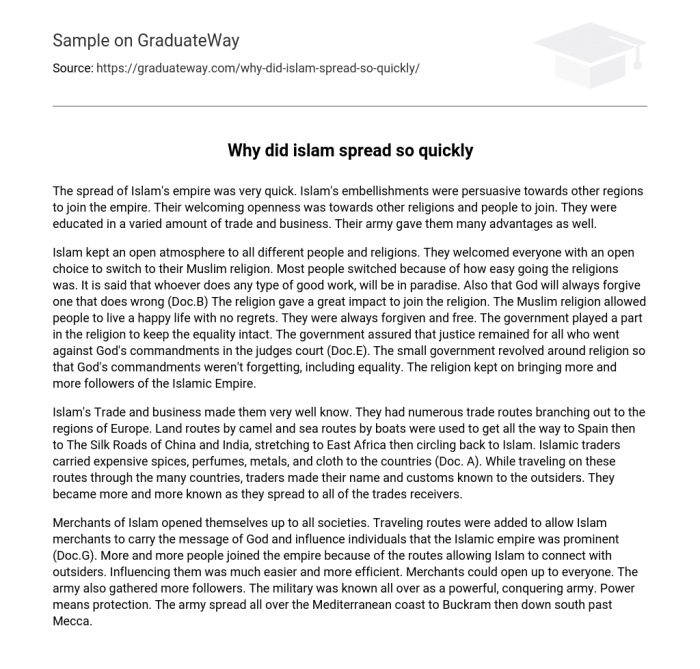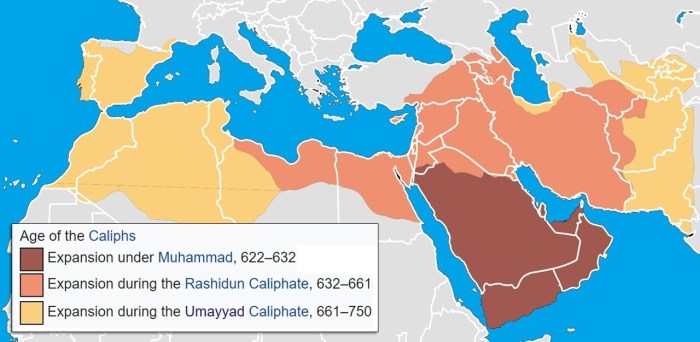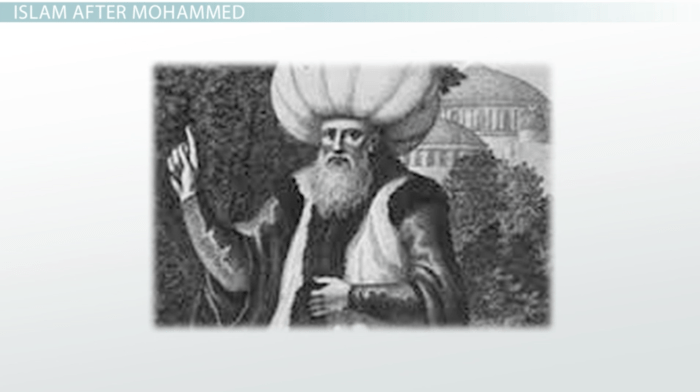The essay on why did Islam spread so quickly sets the stage for this enthralling narrative, offering readers a glimpse into a story that is rich in detail and brimming with originality from the outset. This comprehensive analysis delves into the multifaceted factors that fueled the rapid expansion of Islam, shedding light on the political, economic, social, and cultural forces that shaped its global reach.
The content of the second paragraph that provides descriptive and clear information about the topic
Factors Contributing to Islam’s Rapid Spread

Islam’s rapid spread during the 7th and 8th centuries can be attributed to a confluence of factors, including:
Trade Routes and Commercial Interactions, Essay on why did islam spread so quickly
Trade routes and commercial interactions played a significant role in the dissemination of Islamic teachings. Merchants and traders acted as intermediaries, carrying not only goods but also ideas and religious beliefs across vast distances. The establishment of trading networks, such as the Silk Road, facilitated the exchange of cultural and religious influences, including the teachings of Islam.
Military Conquests and Islamic Empires
Military conquests and the establishment of Islamic empires also contributed to the spread of Islam. The Arab armies’ victories in the Middle East, North Africa, and parts of Europe brought the Islamic faith to new territories. The establishment of Islamic empires, such as the Umayyad and Abbasid caliphates, provided a political and administrative framework for the expansion and dissemination of Islam.
Appeal of Islam’s Message
The appeal of Islam’s message of monotheism, social justice, and equality also played a significant role in its rapid spread. Islam’s emphasis on the oneness of God, the equality of all believers, and the importance of social justice resonated with people from diverse backgrounds.
The teachings of Islam offered a sense of spiritual and moral guidance, as well as a framework for social and political organization.
Political and Economic Advantages of Converting to Islam: Essay On Why Did Islam Spread So Quickly

Conversion to Islam offered several political and economic advantages that contributed to its rapid spread:
Political Benefits
Converting to Islam granted access to power and influence within the Islamic community. Converts could assume positions of authority and leadership within the government and military. The adoption of Islam also fostered a sense of unity and solidarity among Muslims, creating a cohesive political and social entity.
Economic Incentives
Economic incentives also played a role in the spread of Islam. Converts were exempted from certain taxes and granted access to new trade opportunities within the expanding Islamic empires. The establishment of a unified Islamic economic system, based on principles of fairness and equity, provided economic stability and opportunities for growth.
Intermarriage and Cultural Exchange
Intermarriage between Muslims and non-Muslims facilitated the spread of Islam by creating family ties and fostering cultural exchange. The integration of local customs and traditions into Islamic practices, known as syncretism, made Islam more appealing and accessible to people from diverse backgrounds.
The Role of Missionaries and Preachers

Missionaries and preachers played a crucial role in spreading Islam beyond the Arab heartland:
Notable Missionaries and Preachers
Notable missionaries and preachers, such as Khalid bin al-Walid, Tariq ibn Ziyad, and Muhammad ibn Qasim, led military campaigns and established Islamic rule in new territories. Their efforts were instrumental in bringing Islam to North Africa, Spain, and parts of South Asia.
Methods and Strategies
Missionaries used various methods and strategies to attract converts. They engaged in debates and discussions with non-Muslims, highlighting the rational and ethical teachings of Islam. They established religious institutions, such as mosques and madrasas, which served as centers of learning and dissemination of Islamic knowledge.
Establishment of Religious Institutions
The establishment of mosques and madrasas contributed to the growth of Islam by providing spaces for religious instruction, community gatherings, and the preservation of Islamic knowledge. These institutions played a vital role in educating and training future generations of Muslims, ensuring the continuity and spread of the faith.
Social and Cultural Factors
Social and cultural factors also contributed to the appeal of Islam among people from diverse backgrounds:
Social and Cultural Tolerance
Islam’s emphasis on religious tolerance and the incorporation of local customs into its practices made it appealing to people from different cultural backgrounds. The Islamic concept of “dhimmi,” which granted non-Muslims protection and freedom of religion, fostered a sense of inclusivity and acceptance.
Sense of Belonging and Solidarity
The establishment of a unified Islamic community, spanning across different regions and cultures, fostered a sense of belonging and solidarity among Muslims. This shared identity and sense of community made Islam more appealing to people seeking a sense of connection and purpose.
Incorporation of Local Customs
The incorporation of local customs and traditions into Islamic practices, known as syncretism, made Islam more accessible and relatable to people from different cultural backgrounds. This process of adaptation and integration contributed to the spread of Islam and its acceptance among diverse populations.
Expert Answers
Why did Islam spread so quickly?
The rapid spread of Islam can be attributed to a combination of factors, including the appeal of its message, the political and economic advantages of converting, the role of missionaries and preachers, and social and cultural factors.
What were the political benefits of converting to Islam?
Converting to Islam offered political benefits such as gaining access to power and influence within the Islamic community, as well as exemption from certain taxes and military service.
How did missionaries contribute to the spread of Islam?
Missionaries played a significant role in spreading Islam by traveling to different regions, preaching the message of Islam, and establishing religious institutions such as mosques and madrasas.